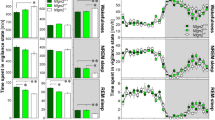Abstract
Adenosine signaling has profound effects on sleep, many of which depend on the adenosine A2A receptor (A2AR). Here, we compared the sleep architecture of adult male A2AR knockout (A2AR-KO) mice and wild-type littermates. While total time spent in each stage of wakefulness, non-rapid eye movement sleep (NREMS), and rapid eye movement sleep (REMS) was normal in A2AR-KO mice, the episode durations of NREMS and REMS were reduced, suggesting that both stages are more fragmented. In addition, time spent in REMS during the light phase was increased. During NREMS, average delta power was reduced. These results provide insights into how congenital lack of A2ARs affects sleep.


Similar content being viewed by others
References
Lazarus M, Oishi Y, Bjorness TE, Greene RW. Gating and the need for sleep: dissociable effects of adenosine A1 and A2A receptors. Front Neurosci. 2019;13:740.
Huang Z-L, Urade Y, Hayaishi O. The role of adenosine in the regulation of sleep. Curr Top Med Chem. 2011;11:1047–57.
Satoh S, Matsumura H, Suzuki F, Hayaishi O. Promotion of sleep mediated by the A2a-adenosine receptor and possible involvement of this receptor in the sleep induced by prostaglandin D2 in rats. Proc Natl Acad Sci USA. 1996;93:5980–4.
Urade Y, Eguchi N, Qu W-M, Sakata M, Huang Z-L, Chen J-F, Schwarzschild MA, Fink JS, Hayaishi O. Sleep regulation in adenosine A2A receptor-deficient mice. Neurology. 2003;61:S94–96.
Huang Z-L, Qu W-M, Eguchi N, Chen J-F, Schwarzschild MA, Fredholm BB, Urade Y, Hayaishi O. Adenosine A2A, but not A1, receptors mediate the arousal effect of caffeine. Nat Neurosci. 2005;8:858–9.
Fang T, Dong H, Xu X-H, Yuan X-S, Chen Z-K, Chen J-F, Qu W-M, Huang Z-L. Adenosine A2A receptor mediates hypnotic effects of ethanol in mice. Sci Rep. 2017;7:1–12.
Zhang B-J, Huang Z-L, Chen J-F, Urade Y, Qu W-M. Adenosine A2A receptor deficiency attenuates the somnogenic effect of prostaglandin D2 in mice. Acta Pharmacol Sin. 2017;38:469–76.
Chen J-F, Huang Z, Ma J, Zhu J, Moratalla R, Standaert D, Moskowitz MA, Fink JS, Scwarzwhild MA. A(2A) adenosine receptor deficiency attenuates brain injury induced by transient focal ischemia in mice. J Neurosci. 1999;19:9192–200.
Hayashi Y, Kashiwagi M, Yasuda K, Ando R, Kanuka M, Sakai K, Itohara S. Cells of a common developmental origin regulate REM/non-REM sleep and wakefulness in mice. Science. 2015;350:957–61.
Wang Y-Q, Li R, Wang D-R, Cherasse Y, Zhang Z, Zhang M-Q, Lavielle O, McEown K, Schiffmann SN, Kerchove d’Exaerde A, Qu WM, Lazarus M, Huang Z-L. Adenosine A2A receptors in the olfactory bulb suppress rapid eye movement sleep in rodents. Brain Struct Funct. 2016;222:1351–66.
Acknowledgements
We thank Jiang-Fan Chen for A2AR-KO mice. This work was supported by AMED under grant numbers JP19dm0107138 and JP19gm1110008; JSPS KAKENHI under grant numbers JP16H06141 and JP16H01264; the MEXT WPI program; the Cell Science Research Foundation; the Asahi Glass Foundation; the Nakajima Foundation; the Senri Life Science Foundation; and the Japan Foundation for Applied Enzymology (to Y.H.).
Author information
Authors and Affiliations
Corresponding author
Ethics declarations
Conflict of interest
We declare no conflict of interest.
Ethical approval
All experimental procedures were approved by the Institutional Animal Care and Use Committee of the University of Tsukuba.
Research involving human participants and/or animals
This research involves animal (mouse) experiments.
Informed consent
Not applicable.
Additional information
Publisher's Note
Springer Nature remains neutral with regard to jurisdictional claims in published maps and institutional affiliations.
Rights and permissions
About this article
Cite this article
Tsai, CJ., Liu, CY., Lazarus, M. et al. Sleep architecture of adenosine A2A receptor-deficient mice. Sleep Biol. Rhythms 18, 275–279 (2020). https://doi.org/10.1007/s41105-020-00260-2
Received:
Accepted:
Published:
Issue Date:
DOI: https://doi.org/10.1007/s41105-020-00260-2




